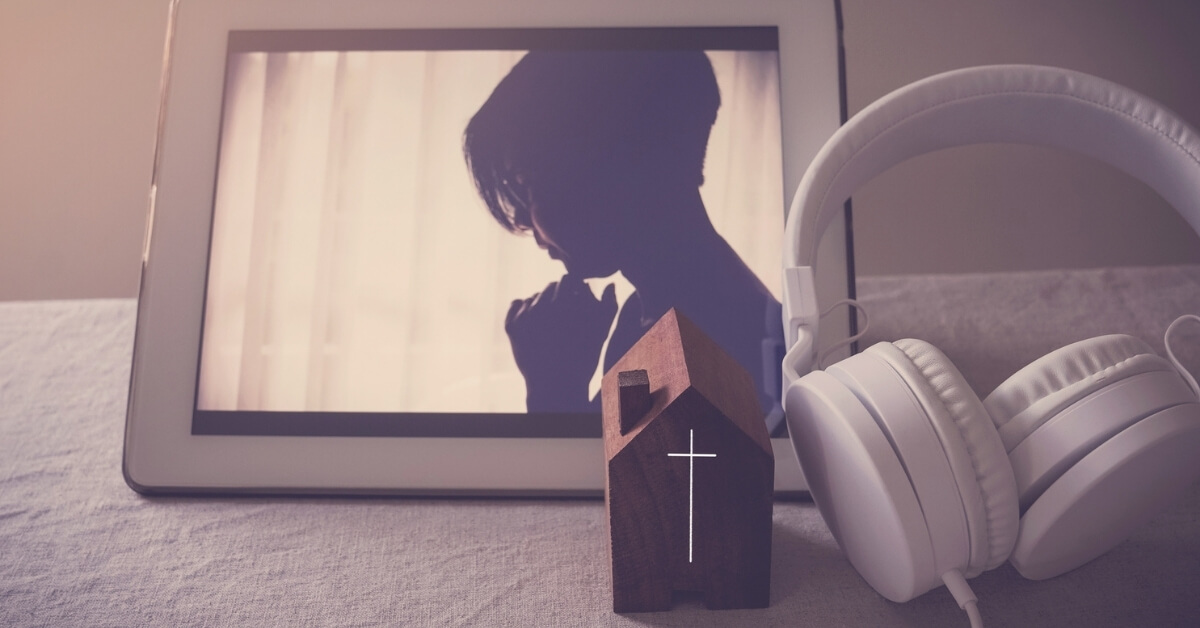Christians and porn have an odd relationship. Most Christians, if asked, would say that porn is wrong, yet an increasing number of Christians (including women, kids, and pastors) admit to watching it.
Part of the reason for this may be we haven’t received clear answers to some big questions about Christians and porn. Generally speaking, we as Christians haven’t always done a great job talking about the problem of porn or equipping people to find freedom and healing. So, let’s dig into some of the biggest, most frequent questions we hear concerning Christians and porn.
1. Can Christians watch porn?
Most Christians have a gut feeling that it’s wrong to watch porn but aren’t exactly sure how the Bible supports this hunch. After all, the Bible never explicitly uses the word “porn.” As we’ll see, many Christians do watch porn regularly. Yes, you can be a Christian and struggle with porn.
But should you? Can you be a Christian and be OK with watching porn? Let’s start by looking at the contrasting messages of porn and the Gospel. As Luke Gilkerson explains in the ebook Your Brain on Porn:
- The Gospel says, “This is my body, which is given for you” (Luke 22:19). Porn culture says, “This is her body, taken by me.”
- The Gospel says, “Your life is hidden with Christ in God” (Colossians 3:3). Porn culture says, “Your life is found in your hidden adventures online.”
- The Gospel says, “Treat older women as mothers, younger women as sisters, in all purity” (1 Timothy 5:2). Our culture says, “Treat older women as cougars and younger women as barely legal.”
Gilkerson concludes, “Pornography is essentially wrong because of its message: it rips sexuality from its relational context and presents human beings not as creatures made in God’s image, but as sexual commodities—something to be bought and sold.”
Furthermore, Jesus makes it clear that looking at someone lustfully is a sin. “But I tell you, everyone who looks at a woman lustfully has already committed adultery with her in his heart” (Matthew 5:28). Check out these articles to dig deeper into biblical perspectives on pornography:
2. How many Christians struggle with porn?
Because it can be uncomfortable to talk about sexual sin, it can be difficult to find accurate statistics about Christians and porn use. After all, gathering this data in church feels risky; people are likely to under-report in a church-wide survey, for example, because they don’t want their secrets getting out. Even the surveys produced by Covenant Eyes are inherently biased in the opposite direction: we’re more likely to attract porn users to take our surveys and therefore are likely to over-report porn use.
See related: Covenant Eyes Porn Stats
In 2014, The Barna Group published a shocking survey which found that 64% of Christian men and 33% of Christian women view porn regularly. Though widely cited, the sample size was limited.
Beyond The Porn Phenomenon, published in 2024 by The Barna Group and Pure Desire Ministries, provides the most current data we have about Christians and porn use compared to the rest of the United States.2 According to this study:
- 61% of the general population (aged 13 and up) watches porn compared to 54% of practicing Christians.
- 75% of Christian men view pornography, compared to 78% of the general population.
- 40% of Christian women view pornography, compared to 44% of the general population.
- Two-thirds of pastors (68%) have struggled or currently struggle with pornography.
If we combined these percentages with US census data, we can see just how many people this is: 45,174,658 Christian men watch porn, and 24,135,395 Christian women watch porn.3
Additionally, over the last few years of working with churches to implement accountability solutions, Karen Potter, Covenant Eyes Director of Church Outreach, observed that dying churches were more likely to have unaddressed pornography problems in their congregations. This tracks with Samuel Perry’s conclusions in his book Addicted to Lust: practicing Christians are less likely to watch porn, but they are more likely to feel extreme guilt or shame over their porn use, and to self-identify as addicted.4
See related: Why do I feel Shame from Watching Porn?
Christian Women and Porn
Men are still more likely to watch porn than women in general, but the number of female porn users increases as they get younger.
A 2020 survey, run by Covenant Eyes in partnership with Crystal Renaud Day, also had some interesting takeaways about female porn users. Now, this was a self-selecting group. Female porn users who use Covenant Eyes Screen Accountability or work with Crystal Renaud Day are more likely to be people of faith in general. Still, of these female porn users:
- 88% attend church regularly, 81% pray regularly, and 72% read their Bible regularly
- Only 6.7% of respondents had heard female porn use discussed in a sermon
Women are not immune to porn. The old dichotomy that men are visually stimulated and women are relationally stimulated is less than helpful when it comes to pornography use. Because stereotypes about “male” and “female” sins exist, female porn users are often driven deeper into shame over their porn use, making recovery that much more difficult.
Pastors and Porn
There’s one more set of stats worth considering. Often, an individual church’s attitude toward pornography is shaped by its leaders. So how many ministry leaders and pastors use porn?
Beyond The Porn Phenomenon found that:
- 18% of pastors currently watch pornography.
- Nearly half (49%) have struggled with pornography in the past.
The implications of this should be sobering. For one thing, pornography use implies that the pastor is not above reproach (Titus 1:7), and is therefore disqualified from the position of elder. I personally would argue for some nuance—there is room for repentance, restoration, and recovery—but as the “watchmen of our souls” (Hebrews 13:17), those in leadership must be vigilant about sin in their flock, and their own sins and temptations most of all.
Mark Denison shares his firsthand experience of being a pastor addicted to porn. He writes, “For 31 years, I was a senior pastor of three churches, ranging in membership from 200 to 2,000. For every one of those 31 years, I struggled with sex addiction. Despite repeated visits to multiple therapists, reading dozens of books, attending a Stephen Arterburn retreat, and repenting thousands of times, I did not find successful recovery until 2013.” Now Mark and his wife, Beth, have a vibrant ministry helping others (including pastors) find healing from porn use. Check out his insights on why pastors struggle with porn and the help they need.
3. How Do Christians Feel About Watching Porn?
Beyond The Porn Phenomenon asked participants how they felt about their own porn use. Christians were more likely to dislike how much porn they used. The numbers indicate increasingly permissive attitudes about pornography.
- 49% of practicing Christians were comfortable with how much porn they used vs. 61% of nonpracticing Christians and 75% of non-Christians.
- 21% of practicing Christians would prefer not to use porn at all. Only 18% of nonpracticing Christians and 12% of non-Christians wished they did not watch porn at all.
- 67% of practicing Christians believe that watching pornography is either very bad or somewhat bad for society vs. 45% of nonpracticing Christians and 32% of non-Christians.
Most denominations that teach a more traditional sexual ethic—that sex is for marriage—agree that porn is sinful. We saw already that Jesus equates looking with lust to committing adultery. I’d argue that for a Christian, a sense of guilt and shame over our sins is a good thing: it is the godly grief that produces repentance (2 Corinthians 7:10). It is the consistent pricking of the Holy Spirit, showing that God is still at work in us (Philippians 1:6).
If you’re struggling with guilt about porn, check out Will God Forgive Me For Watching Bad Things?
4. How can Christians recover from porn?
Physical healing and spiritual and relational restoration from pornography are all possible. Although it takes time to quit porn—a 90-day detox is usually merely the start—eventually, you can reset your neurochemistry to be attracted to your partner, not the variety of porn, and restore your broken relationships with God and others around you.
The recovery process has a few common elements for all people including accountability and counseling. As Christians recover, though, it’s usually helpful to incorporate some aspects of their faith into the recovery process.
1. Get a game plan for quitting porn.
Dr. Doug Weiss has helped thousands and thousands of people find freedom from porn, and we’ve boiled down all that wisdom into six essentials steps for quitting porn.
2. Fight lust, not just porn.
More than just wanting to quit porn, most Christians who struggle with porn really want to overcome lust. Lust is often what fuels our porn use.
In 2 Timothy 2:22, Paul offers some of the best, most concise bits of Biblical advice on how to overcome lust: “So flee youthful passions and pursue righteousness, faith, love, and peace, along with those who call on the Lord from a pure heart.” Commit it to memory. Chew on it daily. Let your mind marinate in it, for in it lies three biblical strategies for fighting lust.
3. Commit to Biblical accountability.
Accountability is key to breaking the power of any addiction. It can take many forms, but the most common are support groups and one-to-one peer accountability. In all cases, the accountability relationship should be focused on breaking the specific behaviors that lead to taking the unwanted action—in other words, identifying triggers that lead you to porn and finding healthier ways to respond—as well as determining consequences for repeated, willful failures and celebrating victories.
But for the Christian, accountability is most powerful when it also focuses on your spiritual growth and development. Biblical accountability is focused on three main components:
- Head accountability, focused on speaking the truth in love.
- Hands accountability, focused on the actions we need to take to break the power of porn.
- Heart accountability, focused on our motives.
All three of these are based on the biblical principle of community: of encouraging one another and building each other up (1 Thessalonians 5:11). When we choose a Christian brother or sister as our ally in the fight against pornography, they will point out the false idols we have made in our lives, of which pornography is just one manifestation, and help us realign our hearts to Christ and the victory over sin that He has already won for us.
4. Understand and utilize the power of prayer.
Often, Christians have the expectation that we should be able to just pray porn away. After all, we know from the miracles listed in the Gospels that Jesus has the power to lift our addictions from us.
Although God doesn’t usually work like that, prayer is still an important tool for Christians as they break free. Prayers of praise and confession help us understand just how big God is and how small we are, and that it is by His grace and mercy that we are saved. The blog post “The Secrets to Effective Prayer Against Pornography” goes into greater depth about how prayer can help us in our fight.
5. Enlist the help of a counselor.
Often, counseling gets a bad rap in churches. Many churches take an almost gnostic approach to addressing sins like pornography: they believe that as long as the sin is addressed, they can ignore the physical and psychological aspects of pornography addiction. But God created our bodies in all their physical and neurochemical complexities (Psalm 139:13-16), and Jesus’ own miracles on earth were a blend of physical and spiritual healing.
In other words, just as we would go to the doctor for a broken bone, so too do we sometimes need professional help for addictions, which often stem from deep wounds and traumas. Consider these stats:
- In the 2020 survey of female porn users conducted by Covenant Eyes and Crystal Renaud Day, 55% of participants had experienced emotional abuse, 43% had experienced verbal abuse, and 43% had experienced sexual abuse. Only 25% had never experienced any form of abuse.
- In his book Unwanted: How Sexual Brokenness Reveals Our Way to Healing, Jay Stringer reported that 33% of people with unwanted sexual behaviors, including pornography, had been touched by a peer in a way that made them feel uncomfortable, and 21% had been touched by an adult in a way that made them feel uncomfortable.
- Even poor parenting can be a feeder into addiction. In his work with addicts, Patrick Carnes notes, “more than 87% of [addicts] come from disengaged families—a family environment in which family members are detached, uninvolved, and emotionally absent. All compulsive and addictive behaviors are signs of significant intimacy disorder and the inability to get needs met in healthy ways.”5
As these stats show, negative childhood experiences ranging from sexual abuse down to simply a family environment where children don’t feel comfortable talking to their parents about what they see online can all contribute to unhealthy behaviors, including pornography use, as an adult.
Again, it’s easy for Christians to say, “Oh, I’ll just pray it away,” but it frequently takes a trained professional—in conjunction with prayer and peer accountability—to help us stare deeply into our wounds and find healing.
5. How can we address the issue of Christians and porn in our churches?
As we’ve seen, pornography use is a problem even among regular churchgoing Christians. And yet it’s not often addressed by churches. The survey conducted by Crystal Renaud Day and Covenant Eyes of female porn users reported:
- 41% of respondents reported that their pastors had at least addressed porn in a sermon
- Only 7% reported that the pastor mentioned females struggling with porn specifically
- Only 10% said their church offered support groups for pornography addiction
If we want Christians to find lasting healing, it will happen best in the local body of Christ—the Church. This does not mean publicly broadcasting peoples’ sins, of course, but rather it means intentionally providing safe spaces for people to come clean and find accountability and Bible-centered trained counselors and support groups. It also means demonstrating the importance of accountability at the leadership level.
Covenant Eyes offers a few resources to help pastors take the lead in fighting porn in their churches.
- Five Stones: Five Stones is a powerful weapon system for pastors and ministry leaders in the fight against porn. Five Stones includes resources for men, women, couples, parents, and leadership.
- Safe Haven Sunday: This event for churches addresses pornography in general with a special focus on how parents can work to keep porn from becoming an issue in their children’s lives in the first place. You can also contact our staff at church@covenanteyes.com for information about running a Safe Haven Sunday event in your church.
As long as there is pornography, the problem of Christians and porn use will never fully go away. That’s just the reality of our sin-stained world. But working together, we can shine the light of the truth on the issue and help many men, women, and children find lasting healing.








I have noticed that most churches & ministries (sadly) do not mention nor preach the fear of the Lord. In so many places, so many scriptures, both New and Old Testament there is mention of the fear of God. David and Solomon state such many times: ‘By the fear of the Lord men depart from evil’…’The fear of the Lord is the beginning of wisdom’… we can all talk about our secret sins all day long, but wisdom of words won’t cut it…It is the power of God; power of the Holy Ghost…Much prayer and fasting, for starters.
In your article which is very good you did not mention recovery ministry celebrate recovery which has sexual periodic classes and helps people struggle with pornography and other sexual aid issues
12 step group is helpful too.
Porn is not good….. but if you do not have the gift of celebacy , when you line it up with outright fornication it becomes the less of the two evils. Single men, this is God ‘s way of telling you that you need to be married. I Cor 7…. if they cannot contain let them marry for it is better to marry than it is to burn.
If porn is in a marriage sexual communication has broken down somewhere.
Sit down and talk and get counsel from qualified people if you need it
.Marriage is honorable IN ALL…. sometimes it can be a sexual aid, but gravitate away from it as you become more experienced in fulfilling your partners sexual need…..Remember you do not have power over your own body Scripture tells us…… so talk it out…… even laugh a little….don’t let your hearts become hard. Stay sweet, stay tender and don’t let it color every other aspect of your marriage.